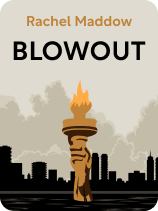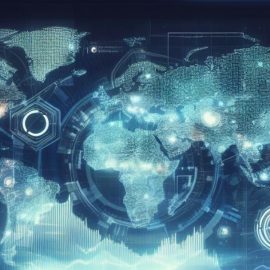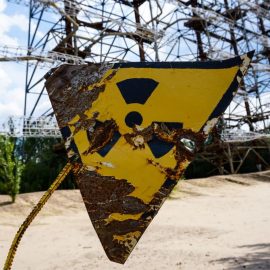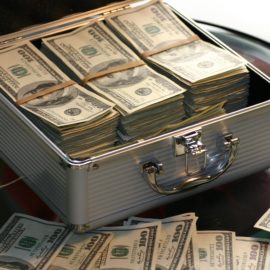

This article is an excerpt from the Shortform book guide to "Blowout" by Rachel Maddow. Shortform has the world's best summaries and analyses of books you should be reading.
Like this article? Sign up for a free trial here.
Is Russia a superpower? How did Russia make Europe dependent on it for oil?
Rachel Maddow writes in her book Blowout that Russia is an energy superpower in Europe. Thanks to this, Russia gained the ability to manipulate several countries by cutting off their supply of gas.
Keep reading for a look at how Russia dominated Europe with energy.
Russia’s Monopolization of the European Energy Trade
Maddow argues that Russia has deliberately cultivated a European dependence on Russian oil and gas and undercut attempts by neighboring countries to develop their own energy industries so they can compete. This dependence has simultaneously boosted the Russian economy and allowed it to advance its foreign policy goals in Eastern Europe; namely, the domination and takeover of Ukraine.
Russia as an Energy Superpower
As of the early 2010s, Russia supplied 40% of the European Union’s gas imports and was the sole supplier of gas to many former Soviet satellite states, including Bulgaria, Slovakia, the Baltics, and Ukraine, making Russia a superpower. The extent of this dependence was revealed by the 2006 New Year’s crisis when Gazprom abruptly reduced the amount of gas being pumped through Ukraine to the rest of Europe. Several states declared national emergencies, lacking the power to operate factories or even heat government buildings.
(Shortform note: An almost identical event occurred in 2009, with Russia once again cutting off its supply to Ukraine and leaving over a dozen European countries without gas. This time the affected countries included Greece, the Czech Republic, Poland, and Serbia. Slovakia had to declare a state of emergency.)
As a result, most European states have sought to strengthen their relationship with Russia in the past two decades, seeing it as a necessary ally and a safer alternative to partnerships with OPEC nations in the Middle East. The Nord Stream pipeline, constructed jointly by Germany and Russia with the approval of the European Union, cemented many of these relationships.
(Shortform note: As of early 2023, none of the Nord Stream pipelines are operational. Work on the project was halted in Germany following Russia’s 2022 invasion of Ukraine, and several pipelines were damaged in an explosion of unknown cause in September that same year.)
Russian Interference in Ukraine
The extent of this dependence in Eastern Europe in particular has allowed Russia to manipulate the internal policy of certain countries. For example, Ukrainians have been “punished” for making moves toward joining NATO and the EU by having the cost of gas raised or their supply cut off. These tactics work in combination with mobsterism (Ukrainian politicians have been mysteriously poisoned or arrested on false charges) and Russian-backed puppet leaders, such as former president Viktor Yanukovych, to undermine Ukraine’s independence and give Russia near-total control over Ukraine’s economy.
Maddow argues that Russia’s domination of Ukraine is motivated by both economic advantages and Putin’s Russian nationalism, which sees Ukraine as the historical property of Russia and its independence since 1994 as illegitimate. Repeated attempts by Ukrainians to oppose Russian interference or elect anti-Putin leaders culminated in a series of conflicts in 2014. Russia invaded and annexed the Crimean peninsula a few months later, and in the years since war has continued in eastern Ukraine. While the annexation of Crimea was widely condemned, Maddow points out that few European nations intervened on Ukraine’s behalf, afraid to jeopardize their relationship with Russia and thus their access to Russian gas.
(Shortform note: By contrast, the February 2022 invasion prompted most of Europe to impose sanctions on Russia and pull out of joint deals. Ukraine has received billions in humanitarian aid, weapons, and combat equipment from the European Union and the United States, while Russia has mainly received support from Belarus and possibly Iran. The war is ongoing as of 2023, and it’s currently unclear how the balance of power in Europe will shift once the conflict ends.)
Russia’s American Allies
Maddow claims that both Russia’s status as an energy superpower and its encroachment on Ukraine would have been impossible without its long-standing partnership with ExxonMobil. While Russia has massive gas and oil reserves, both the equipment and the technology used by Rosneft and Gazprom are decades out of date, and relatively few new wells have been discovered and developed since the end of the Soviet era in 1991.
The Rosneft-ExxonMobil deal signed in 2011 gave ExxonMobil significant tax breaks in exchange for drilling new wells and helping to modernize Russia’s process. Both companies have made an enormous profit from this relationship, and ExxonMobil has fought to maintain it, even in the face of the economic sanctions imposed on Russia by the US and much of Europe in 2014. In fact, ExxonMobil shut down its operations in Russia only after being explicitly ordered to do so by the Obama administration.
(Shortform note: ExxonMobil tried to renew its relationship with Russia in 2016 but was denied a waiver from sanctions by President Trump. It pulled out of Russia entirely following the invasion of Ukraine. Despite this, 2022 was a year of record profits for the company.)
Maddow argues that the Trump administration was another significant ally to Russian energy, with former ExxonMobil CEO Rex Tillerson serving as Secretary of State for several years. One of President Donald Trump’s first acts in office was to nullify a 2010 law that required American energy companies to publicly report on their dealings with foreign governments. While Trump did not roll back the sanctions, he frequently praised Russia and Putin’s leadership, and Maddow points to evidence that the two leaders may have colluded to secure Trump’s 2016 electoral win.
| Trump’s Record on Russia and Energy Rex Tillerson’s influence in government didn’t last long, as he was fired from his position in March 2018 alongside a number of other White House officials. Still, the Trump administration worked continuously to roll back environmental regulations and encourage oil and gas companies in the US to expand. Though these moves were condemned by environmentalists, energy companies argued that they would make US energy independence possible—in 2020, the US exported more energy products than it imported. Trump’s successor, President Joe Biden, has attempted to reverse some of these policies, with mixed results. Trump critics and supporters disagree on how lenient his administration was toward Russia. Some, like Maddow, have accused him of trading information with Russia during his campaign and possibly while in office. Others point out that his administration imposed a number of new sanctions on the country and argue that, if anything, Trump actually failed to keep his campaign promise to improve US-Russia relations. |

———End of Preview———
Like what you just read? Read the rest of the world's best book summary and analysis of Rachel Maddow's "Blowout" at Shortform.
Here's what you'll find in our full Blowout summary:
- A deep dive into the corruption and exploitation in the oil and gas industry
- Examples of how the discovery of oil can weaken a country
- Possible ways to protect the world from the energy industry






